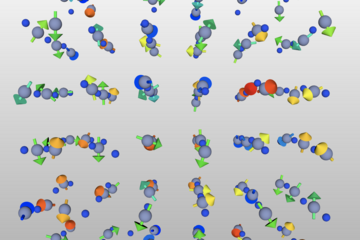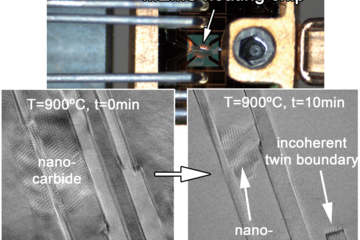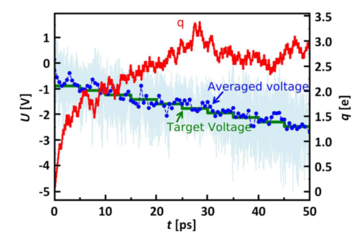All genres
1161.
Talk
Metastable Nanostructured Metallic Alloy. The KAIST Lecture in Materials Science and Engineering 2019, Korea Advanced Institute of Science and Technology KAIST, Daejeon, Korea (2019)
1162.
Talk
Atomic-Scale Analysis of Chemistry at Lattice Defects. The KAIST Lecture in Materials Science and Engineering 2019, Korea Advanced Institute of Science and Technology KAIST, Daejeon, Korea (2019)
1163.
Talk
κ carbide microstructures and the role of interfaces in high-Mn lightweight steels. High-Mn Steel 2019, Aachen, Germany (2019)
1164.
Talk
Abnormal magnetic behavior of FeNiCoMnCu high entropy alloys. DPG Regensburg 2019, Regensburg, Germany (2019)
1165.
Talk
Quinary TWIP-TRIP high-entropy alloys: design, microstructure and mechanical properties. DPG Regensburg 2019, Regensburg, Germany (2019)
1166.
Talk
The importance of crystallographic defects in Ag16.7Sb30Te53.3 thermoelectric bulk materials for the thermoelectric properties. EBSD conference 2019, National Physical Laboratory, Teddington, London, UK (2019)
1167.
Talk
Tuning magnetic properties of high entropy alloys: A combined theoretical and experimental study. DPG Regensburg 2019, Regensburg, Germany (2019)
1168.
Talk
From Atomistic Understanding to Engineering Design of Advanced Medium and High Manganese Steels. 4th International Conference on medium and high Manganese steels, Aachen, Germany (2019)
1169.
Talk
On the mechanism of displacive phase transformation in metastable high entropy alloys. DPG Regensburg 2019, Regensburg, Germany (2019)
1170.
Talk
Hydrogen embrittlement of medium Mn steels with ferrite matrix or austenite matrix. 4th High Manganese Steel 2019 HMnS, Aachen, Germany (2019)
1171.
Talk
Recent progresses in the understanding of metastable high-entropy alloys. TMS 2019 Annual Meeting & Exhibition, San Antonio, TX, USA (2019)
1172.
Talk
Asymmetric Line Segregation at Faceted Si Grain Boundaries. TMS 2019 Annual Meeting & Exhibition, San Antonio, TX, USA (2019)
1173.
Talk
Atomic scale analysis of grain boundary deuteride growth front in Zircaloy-4. TMS 2019 Annual Meeting and Exhibition, San Antonio, TX, USA (2019)
1174.
Talk
Solute segregation effect at planar defects during creep of CoNi- & Co-based superalloys. TMS 2019 Annual Meeting and Exhibition, San Antonio, TX, USA (2019)
1175.
Talk
Understanding deformation mechanisms in superalloys through atomic scale microanalysis. TMS 2019 Annual Meeting & Exhibition, San Antonio, TX, USA (2019)
1176.
Talk
Compositional Lattice Defect Manipulation for Microstructure Design. The Bauerman Lecture 2019, Department of Materials, Imperial College London, Royal School of Mines, London, UK (2019)
1177.
Talk
Correlation of Microstructures and Thermal Conductivity of the Thermoelectric Material Ag16.7Sb30Te53.3. North American Thermoelectric workshop, Northwestern University, Eanston, Chicago, IL, USA (2019)
1178.
Talk
The thermal conductivity of Ag16.7Sb30Te53.3 bulk thermoelectric with high density of planar faults. 38th/4th International and Asian Conference on Thermoelectrics , Gyeongju, South Korea (2019)
1179.
Talk
Introduction to (3D)-EBSD (what can EBSD do for you ?). Bruker EDS User Meeting, Berlin, Germany (2019)
1180.
Talk
Obtaining constitutive parameters for a physics-based crystal plasticity model from macro-scale behavior. International Conference on Plasticity, Damage, and Fracture , Panama City, Panama (2019)











